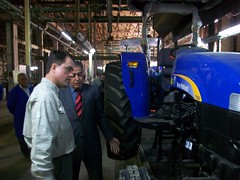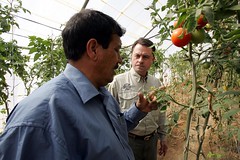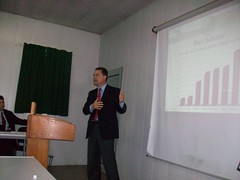The Colorado Department of Agriculture took an innovative approach to pest control over 60 years ago and established the Palisade Insectary dedicated to the biological control of noxious weeds and pest insects. This is the time of year when there is a high demand for three little bugs.
Bindweed Gall Mites (Aceria malherbae)
The bindweed gall mite is a microscopic, wormlike mite used to suppress the field bindweed. It stunts the growth of the plant and reduces seed production. For more information on the mite and field bindweed, visit http://www.colorado.gov/cs/Satellite/Agriculture-Main/CDAG/1215504131010
Leafy Spurge Flea Beetles (Aphthona spp)
The Insectary collects and releases several hundred thousand flea beetle adults every year. The beetles lay eggs on the soil surface and their offspring dig into the soil where they find and feed on the roots of leafy spurge. For information on this beetle and leafy spurge, visit http://www.colorado.gov/cs/Satellite?c=Page&cid=1215504130098&pagename=Agriculture-Main%2FCDAGLayout
Toadflax Stem Weevil (Mecinus janthinus)
This weevil has shown good promise for control of Dalmatian toadflax. It is capable of killing a large portion of the above-ground plant by boring into and killing the stems. For more information on the weevil and Dalmatian toadflax, visit http://www.colorado.gov/cs/Satellite?c=Page&cid=1215504130978&pagename=Agriculture-Main%2FCDAGLayout
“Many noxious weeds in Colorado devalue rangelands, pose a threat to livestock, compete with crops, crowd out valuable native plants, use precious water and degrade wildlife habitat” said Dr. Dan Bean, CDA’s Insectary manager. “Biocontrol is an inexpensive and environmentally sound method of suppressing the spread of these noxious weeds.”
The Insectary, located in Palisade, is among only a handful of programs across the U.S. that provides farmers, ranchers and resource managers with dozens of species of beneficial insects and mites as tools for use in Integrated Pest Management programs. It produces and releases about 30 different species of biological control agents to combat noxious weeds and insect pests spreading throughout Colorado.
Bugs from the Insectary are available for purchase through CDA’s Request-a-Bug program. For more information on the Palisade Insectary, including how to request a bug, visit http://www.palisadeinsectary.com/. Noxious weed infestation maps are available at http://www.colorado.gov/cs/Satellite/Agriculture-Main/CDAG/1178305815669









